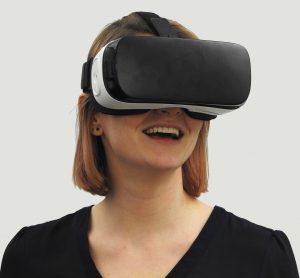What is it?
Formed in July 2017, the objectives of the Augmented Reality/Virtual Reality Network are to foster a UofT community group that provides an opportunity to share work we are doing across academic program areas, learn from one another and facilitate communication regarding emergent opportunities in the domain of XR (eXtended realities or immersive technologies for teaching and learning).
All faculty and staff at UofT who are actively involved with or planning for AR/VR projects work are welcome to join.
View a list of AR and VR projects by U of T community members
How to join?
A listserv has been set up for those who wish to receive communication about network activities. The list is called AR-VR-NETWORK-L. To subscribe please send an email to listserv@listserv.utoronto.ca and, in the text of your message, write: SUBSCRIBE ar-vr-network-l . You should then get a message confirming your subscription.
The purpose of the listserv is to provide a channel for sharing information about upcoming events, funding opportunities and resources pertinent to those developing AR/VR resources for educational contexts. As this group is intended for University of Toronto community members, please use a utoronto email to join.
Past Meetings and Events
Creating and Forecasting Educational Immersive Technologies
Tuesday, October 23, 2019
Location: MADLab
Professor Shadi Dalili, Chemistry, UTSC will be sharing her experience expanding the 3D molecule visualizations she and her team developed in AR, and development of the ARchemy app. Preliminary expansion into a VR platform will be shown, with exploration of potential future gamified learning activities.
Paul C. Alexander, PhD Candidate in OISE’s department of Curriculum, Teaching, and Learning and, recently having taught “CTL5047: Immersive Technology in Education,” will share key takeaways from this graduate-level course and offer informed insights into where immersive technology (360-VR-AR) in education is headed in the near-to-distant future.
——————————————-
Workshop: On the Horizon, Virtual or Augmented Reality and Pedagogical Innovation October 23, 2018
(hosted by the Centre for Teaching Support and Innovation at U of T)
Can virtual reality facilitate rich and authentic learning experiences? This orientation workshop aimed at instructors and educational technology support staff introduced the potential of AR (augmented reality) and VR (virtual reality) for teaching and learning by presenting creative examples of the use of these technologies at the University of Toronto and beyond. Participants discussed the applicability of XR (eXtended Reality) technologies for specific course goals and explored related instructional design considerations.
Facilitators:
Laurie Harrison, Director, Online Learning Strategies
Diane Michaud, Instructional Technology Liaison Librarian, UTM Library
Dawn Kilkenny, Associate Professor, Teaching Stream, Institute of Biomaterials and Biomedical Engineering
Fahad Alam, Assistant Professor, Anesthesia, Collaborative Human Immersive Interaction Lab (CHISIL)
Johanna Carroll, Assistant Professor, Teaching Stream, Molecular Genetics
Martina Steiner, Assistant Professor, Teaching Stream, Molecular Genetics
————————————-
AR-VR Round Table with Tecnológico de Monterrey
February 8, 2018
A “lightning round” of presentations/Q&A on the following topics:
- Mike Spears (UofT) – MADLab facilities and development support
- Alexander Sullivan – Biomedical Lab Project
- Will Heikoop – Labster pilot
- Using VR as alternative credentials: teclabs.io
- Emerging educational technologies using VR: http://mostla.tec.mx/vrmedicina/
————————-
Collaborative Human Immersive and Interactive Lab (CHISIL)”at the Hospital for Sick Kids
November 30, 2017
CHISIL is where our hosts for this meeting, Clyde Matava and Fahad Alam created a pre-surgery “orientation” in immersive 360 degree video as part of their patient education initiative (read more: U of T Faculty of Medicine ; Canadian Healthcare Technology; or Toronto Star.)
————————-
Intro to AR/VR at UT’s MADLab (mobile application development lab).
October 23, 2017
Mike Spears, MADLab Manager outlines the services and show the equipment of the lab. He will also talk about the capabilities of ARKit, Unity and WebVR and how they can be integrated with the equipment at the lab. After the guided tour, you can have your turn trying out their HTC Vive “room scale” VR headset for 5 or 10 minutes (depending on demand).
The MADLab is located in Gerstein Science Information Centre, Room B112 (at the south end of the first lower level).
————————-
Launch Meeting
July 19, 2017
Project Team introductions and discussion of shared interests. Hosted by Human Biology.
————————-
Network Coordinators:
Laurie Harrison, Director, Digital Learning Innovation, U of T
Diane Michaud, Librarian, Victoria College in the University of Toronto
